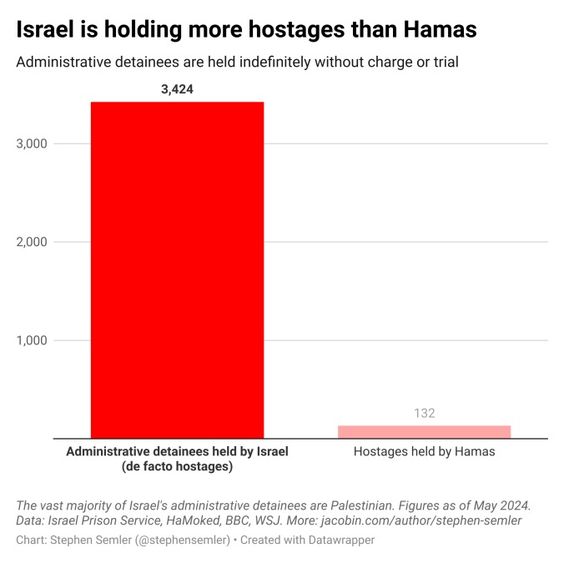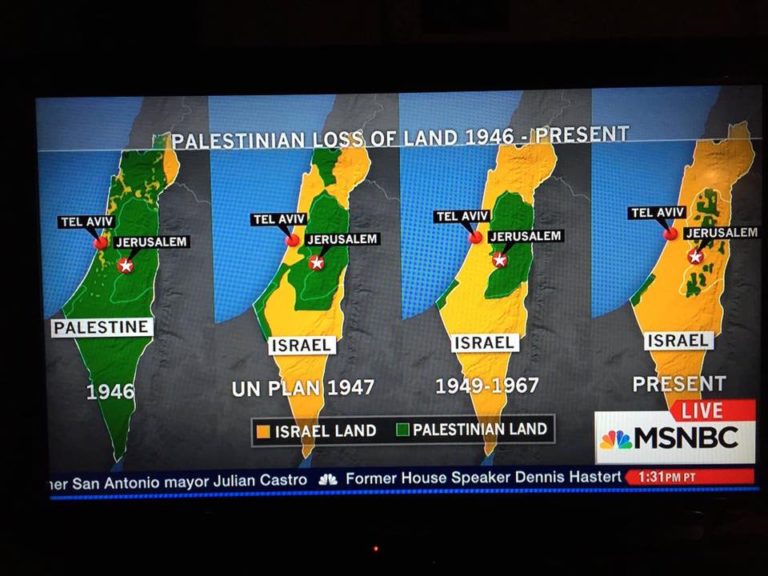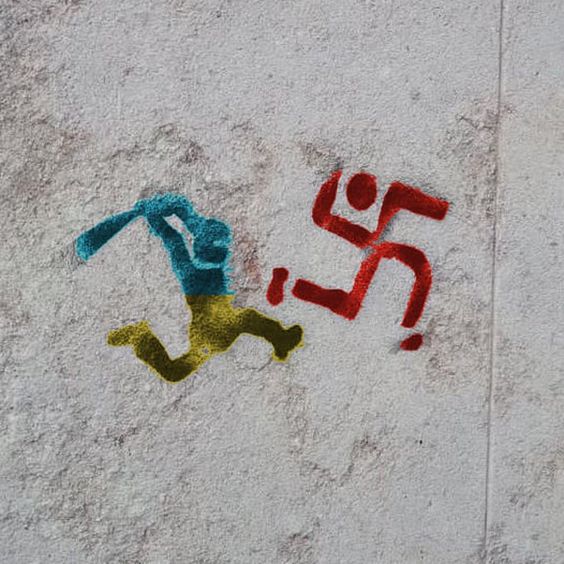
As of 28 August 2024, 117 hostages had been returned alive to Israel, with 105 being released in a prisoner exchange deal, four released by Hamas unilaterally, and eight rescued by the Israel Defense Forces (IDF).[11][12] 37 bodies of hostages were repatriated to Israel, with three of the hostages killed by friendly fire from the IDF[13][14] and the bodies of thirty-four hostages repatriated through military operations.[15][16]
As of 1 September 2024, 101 hostages remained in captivity in the Gaza Strip, 97 of whom had been abducted on 7 October 2023, and the other four hostages were captured earlier. At the start of the war, Hamas offered to release all hostages in exchange for Israel releasing all Palestinian prisoners.
By October 2023, Israel held 5,200 Palestinians, including 170 children, in its prisons.[23]
On 22 November 2023, Israel and Hamas agreed to the release of 150 Palestinian prisoners and a four-day cease-fire in exchange for Hamas’s release of approximately 50 of the hostages. The exchange involved hostages from the categories of women and children.[25][26][27] As of 30 November 2023, the last day of the ceasefire, 105 civilian hostages had been released, which included 81 people from Israel, 23 Thais, and one Filipino.[11]
In April 2022, there were 4,450 Palestinian security prisoners in Israeli prisons – including 160 children, 32 women, and over 1,000 “administrative detainees” (indefinitely incarcerated without charge).[4] According to B’tselem, since the outbreak of the Israel-Hamas war on 7 October 2023, Palestinian prisoners with Israeli citizenship have been stripped of many of their rights.[5] It further found that abuse of detainees is so institutionalized that the prisons should be called ‘torture camps.’[6]
In December 2011, 4,772 Palestinian security prisoners were serving terms in Israeli prisons. Of these, 552 were sentenced to life terms.[7] By July 2024, there were 9,623 Palestinians incarcerated by Israel and 4,781 in administrative detention for alleged security reasons.[8]
The Israeli military court system for the occupied territories
The Israeli military court system for the occupied territories, modeled partially on the British military court system set up in 1937,[9] was established in 1967 and had been called the institutional centerpiece of the occupation, and within it, West Bank Palestinians are treated as “foreign civilians.”[10]
The measures it applies, combining elements of colonial administration and martial law, cover not only incidents involving recourse to violence but many other activities, non-violent protests, political and cultural statements, and the way Palestinians are allowed to move or associate with each other.[11]
Some of the problematic facets of the system Palestinian prisoners are subject to are, according to sociology professor Lisa Hajjar, prolonged detention of suspects incommunicado, impeding a client’s access to his lawyer, the routine use of coercion under interrogation to obtain confessions, and the introduction of “secret evidence.”[12]
Hundreds of thousands of Palestinians have been put on trial since 1967. According to Saree Makdisi the cumulative total of Palestinians imprisoned by Israel reached 650,000 in 2005.[13] According to Tamar Pelleg-Sryck (2011), tens of thousands of these people have been subjected to administrative detention.[14] The incarceration rate was the highest in the world during the First Intifada (1987–1992) – and their conviction rates varied from 90 to 95%, being, for the most part, secured by plea bargains in 97% of cases. According to Red Cross statistics, in the first two decades of the occupation, from 1967 to 1987, one in three Palestinians, about 500,000, were detained by Israeli forces,[15] and on any given day, the courts would be crammed with “children in handcuffs, women pleading with soldiers, anxious people thronging lawyers for information.”[16] After the Oslo Accords, courts in Palestinian towns were withdrawn to Area C, causing more incredible difficulty for lawyers and families of the defendants to access the tribunals because of the permit system.[17]
On 11 December 2012, the office of then-Prime Minister Salam Fayyad stated that since 1967, 800,000 Palestinians, or roughly 20% of the total population and 40% of the male population, had been imprisoned by Israel at one point in time. About 100,000 had been held in administrative detention.[30] According to Palestinian estimates, 70% of Palestinian families have had one or more family members sentenced to jail terms in Israeli prisons as a result of activities against the occupation.[31]
In April 2008, Adalah: the Legal Center for Arab Minority Rights in Israel stated that 11,000 Palestinians were in prison and detention in Israel, including 98 women, 345 minors, 50 members of the Palestinian Legislative Council, and three ministers of the Palestinian National Authority.[37] Of these 11,000 Palestinian prisoners, 8,456 were from the West Bank, 762 from the Gaza Strip, and 694 from within Israel itself (including 552 from Jerusalem).
Since the 2023 Hamas-led attack on Israel, Israel has revoked work permits for residents of Gaza. Since then, between 4,000 and 5,000 Palestinians working in Israel who were attempting to flee have gone missing, having been detained by the Israeli government.[39] Released Palestinians have recalled being blindfolded with their hands and feet tied and later being beaten by Israeli forces, who withheld food, water, and medical supplies.[39]
Minors
From 2000–2009, 6,700 Palestinians between the ages of 12 and 18 were arrested by the Israeli authorities, according to Defence for Children International‘s Palestine Section (DCI/PS). In 2009, a total of 423 were being held in Israeli detention and interrogation centers and prisons. In April 2010, the number dropped to 280. DCI/PS states that these detentions stand in contravention of international law.[40] Up to August 2013, 193 minors were imprisoned, and according to The Economist, “nearly all” were “brought to court in leg shackles and handcuffs.”[41]
Al Jazeera reported that between 2000-2023, 12,000 children have been detained by Israeli forces.[42] In 2023, at least 880 Palestinian children have been detained by the IDF.[43]
Breach of international law
“Terrorists” versus “prisoners of war”
Further information: right to resist
In July 2003, the International Federation for Human Rights (FIDH) reported that “Israel does not recognize Palestinian prisoners as having the status of prisoners of war.”[33] The prisoners are instead treated as politically motivated criminals or terrorists and either charged with terrorist offenses or violent crimes or administratively detained without charge.
It has been argued by supporters of the Palestinian cause that according to the Geneva Conventions, Palestinians who are members of armed resistance organizations should be entitled to prisoner of war status and not called terrorists.[73]
The position of the Geneva Conventions with regard to Palestinians detained for armed activity against Israeli forces is not entirely clear. Additional Protocol I[74] – which applies during armed conflicts against alien occupations (Article 1(4) ) – would give lawful combatant status (and therefore prisoner of war status if captured) to fighters who do not wear uniforms or have a distinctive mark due to the nature of the conflict, so long as they carry arms openly during military engagements (see Article 44(3) ). However, Israel has not ratified this protocol.[75]
The Third Geneva Convention of 1949,[76] which Israel has ratified,[77] provides more limited protection, giving prisoner of war status to fighters in organized resistance movements to fulfill conditions laid out in Article 4(2), including “being commanded by a person responsible for his subordinates” and “having a fixed distinctive sign recognizable at a distance”, with Article 4(6) protecting inhabitants of non-occupied territory who spontaneously resist the enemy in some circumstances.

The B’Tselem report, “Welcome to Hell,” isn’t only a report about what’s happening in Israel’s prison facilities; it’s a report about Israel. Anyone who wants to know what Israel is should read it before any other document. – Gideon Levy
“Welcome to Hell” is a report on the abuse and inhuman treatment of Palestinians held in Israeli custody since 7 October 2023. B’Tselem [the main Israeli human rights organization] collected testimonies from 55 Palestinians held during that time and released, almost all with no charges. Their testimonies reveal the outcomes of the rushed transformation of more than a dozen Israeli prison facilities, military and civilian, into a network of camps dedicated to the abuse of inmates as a matter of policy. Facilities in which every inmate is deliberately subjected to harsh, relentless pain and suffering operate as de-facto torture camps.
https://www.btselem.org/publications/202408_welcome_to_hell




3 Comments
Pingback: Lous Theroux "The Settlers" (2025) shows where the Colonialism Project of Apartheid State Israel is after 77 years of Zionist Jewish Supremacy Ideology - Bergensia
Pingback: Nakba Day May 15., 2025: We Existed Then, We Exist Now, We Will Continue to Exist - Bergensia
Pingback: 10 Institutions Accuse Israel of Genocide in Gaza - Bergensia